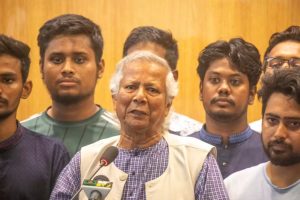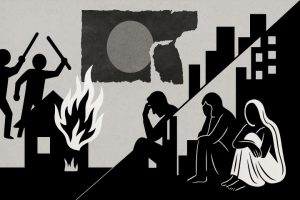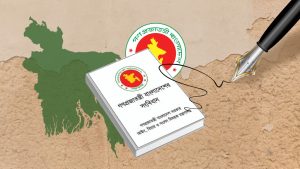The Gopalganj Incident Is a Vote of No Confidence to the Yunus Government

What Really Happened in Gopalganj?
The nation doesn’t yet fully know what’s happening in Gopalganj. The number of deaths is not the most pressing question—the manner of those deaths is. It’s also no longer the key issue why an unregistered political party like the NCP was given full government protocol to hold a public rally there. Whether the footage of NCP leaders fleeing is comical or disgraceful is irrelevant now. What matters is that the leaders’ escape reflects the very reality of the current regime.
Much like a terminal patient confined to the ICU, the NCP’s political life now survives in the trunk of an armored vehicle. And since this party represents the “King’s Party” of the Yunus regime—by extension, the Yunus government also finds itself in that trunk.
Yunus’s Popularity Has Long Collapsed
Muhammad Yunus’s popularity collapsed long ago, something I wrote about extensively in this column months back. That the “king’s party” now exists only in the back of an armored car is no longer up for debate.
The people of this country are experiencing despair in the markets, standing helpless before locked factories, watching the ashes of burnt-down industrial plants. Export routes are shutting down one after another. Industrialists are seeking loans just to pay wages, only to be met with disappointment. Diplomatically, Bangladesh is almost isolated from the world. Daily, obtaining a visa from any country becomes increasingly difficult for the average Bangladeshi. The government has utterly failed to competently respond to the Trump administration’s new 35% tariff, in addition to the earlier 15% imposed on Bangladesh’s key exports, particularly garments. It didn’t even involve the business community in any negotiation.
After ruining farmers during Eid just to maintain the PR slogan “vegetables are cheap,” it’s hard to expect that people still have any confidence left in this government.

Rule by Mob, Not Constitution
From the very first day, the Yunus government—through what its press secretary calls “pressure groups,” but what ordinary people rightly call mobs—has tried to rule the nation through fear. Such a strategy disregards the fundamental structure of a constitutional and well-organized country like Bangladesh.
These mobs didn’t just operate in cities—they burned down homes in villages, extorted money, beat people, forced civil servant transfers, orchestrated dismissals, triggered high-profile resignations, and rendered the police nearly inactive. On top of that, the government turned a blind eye to minority persecution—and this marks the first time in Bangladesh’s history that a head of government has done so. The symbol of this denial? The image of a raped woman stripped naked in Muradnagar—and more recently, even muggers have been seen stripping passersby of their clothes.
At this moment, the country is symbolized by these naked, brutalized images—of women violated, and men left helpless and humiliated.
Reckless Reform and Constitutional Overreach
As if all this weren’t enough, the regime is now talking about constitutional reform in the name of national restructuring. For the people of Bangladesh, the Constitution—like the country’s independence—is sacred. Both were earned through blood and honor. If any government ever amends the Constitution in a way that violates its spirit, it is the responsibility of the Supreme Court—as guardian of the Constitution—to strike it down. That right is embedded in the Constitution itself.
But if additions or deletions are to be made, they must come through a democratically elected Parliament. The idea that a ruler can send elephants to randomly pick people off the streets and assign them the task of redesigning the Constitution defies all logic.

Why should individuals or unelected governments take on roles meant for elected representatives? Personally, I support the idea of a proportional voting system in Bangladesh. But as long as our political parties remain personality-driven, that goal will take a long journey to reach. Perhaps better systems will emerge in time.
I also believe, personally, that Bangladesh should be divided into a few provinces based on population. But Bangladesh is defined by its Constitution as a “unitary country.” Following the repeal of certain parts of the Eighth Amendment, such ideas can only be realized through proper constitutional procedures—not personal ideology.
No Legitimacy Without Representation
No matter how appealing these ideas may seem to me, if I begin pursuing them while holding unaccountable state power, people will inevitably question my sanity.
Even so, parties loyal to the country and to the spirit of independence have shown remarkable patience. They continued attending Yunus’s so-called “NGO motivation classes” disguised as reform workshops. But after the events of August 5, many realized they had made a grave mistake in selecting the current government leadership.
Despite their many flaws, politicians tend to be patient. Every day, they must listen to endless complaints from the public—many of them trivial or off-topic—and try to solve them. If someone like me had to endure that, I’d probably lose my mind in a day. It’s out of sheer national interest—and the need for a credible election—that they’re still showing up to these NGO-style classes.
But the general public is not as patient as politicians.
The People of East Bengal Are Different
This land—today’s Bangladesh, the riverside lands of the Padma, Meghna, and Jamuna—has long been misunderstood. Two leaders truly understood it: Sher-e-Bangla A.K. Fazlul Huq and Bangabandhu Sheikh Mujibur Rahman. Both spoke repeatedly of how the soil here is soft during monsoon and hard during summer. And how, when river erosion sweeps away their homes, these same people begin rebuilding the very next morning, shoulder to shoulder—completely forgetting the conflict of the previous day.

Even those who moved to West Bengal still proudly claim two things: their Bangla dialect and their East Bengal Football Club. No Western NGO-style psychological conditioning will work on these people. They are of a different character.
This is why no “corridor pill” from the UN works here, nor do Gaza-style human rights prescriptions.
The Fuse Lit in Gopalganj
Even the politicians had been silent about these “reform pills,” thinking that the country had already suffered too much in the past year, and now needed peace. But when the government’s favored children chose July 16 not to visit the grave of their political icon Abu Sayeed, but instead descended upon Gopalganj—the public saw through their meticulous design.
The response was immediate. The very next day, the Jubo Dal marched through Dhaka chanting:
“This is the land of my ancestors—not for collaborators!”
The Gopalganj explosion was a warning shot—represented by the image of leaders hiding in armored trunks. It revealed what might happen if this fire spreads across the rest of the country.
A Government That Misread the People
The Home Minister stated that the government had some intelligence, but not the full extent. That’s not surprising—they were looking for what the Awami League might do, not what the people would do.
But the people of Gopalganj are also the people of Bangladesh.
And now, the people have made their verdict clear. They no longer trust the Yunus government. The message is that a new government—capable of restoring stability, earning the trust of the police and the public, and ensuring a free and fair election—must be peacefully and swiftly formed.

A Poetic Reflection on What Comes Next
Some may ask, why not write about the curfews, the viral torture videos from Gopalganj, or the grieving mothers? Yes, atrocities are happening. Homes are being broken. But what comes after?
Rabindranath Tagore foresaw it even during British oppression:
“How many arches of victory fell, how many palace spires looted,
How many kings’ prisons crumbled to dust.
Even when Alipore jail vanishes from memory,
Still, this world-child will await flowers with patience.
The colored uniforms, the idols of tyranny, will fade,
But in the forest’s quiet corner, the shy jasmine will still bloom.”
Footnote
If I now write in this footnote that—on this lush, silt-laden land of Bengal—the only permanent thing is the scent of jasmine, I know I’m risking killing the soul of Tagore’s poem.
But I’ve written it anyway.
And I request readers—please, don’t read this footnote.
— The author is a recipient of the highest state honor and the Editor of Sarakhon and The Present World.












